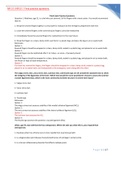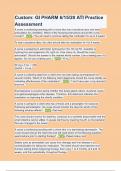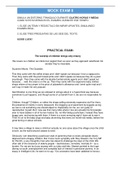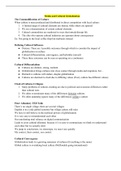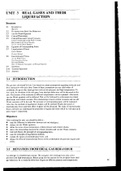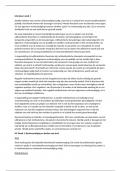Protein Synthesis I
Professor Robert Hinges
Explain the terms 'transcription' and 'translation' and identify sites of transcription and translation in
prokaryotic and eukaryotic cells
Transcription
Transcription is the process by which the information in a strand of DNA is copied into a new
molecule of messenger RNA (mRNA)
Translation
Translation is the process by which a protein is synthesized from the information contained
in a molecule of messenger RNA (mRNA)
Locations
Prokaryotes
o Transcription and translation are coupled; that is, translation begins while the mRNA
is still being synthesized
Eukaryotes
o Transcription occurs in the nucleus
o Translation occurs in the cytoplasm
Outline the mechanism of RNA synthesis in prokaryotic cells
RNA polymerase enzymes make RNA
Addition of nucleotides in a 5’ → 3’ direction
Requires a template, the two strands of DNA need to be separated
Like in DNA, the nucleotides in RNA are joined by covalent phosphodiester bonds
,Transcription has 3 Main steps:
Initiation
o RNA polymerase is directed to the start site of transcription on the double stranded
DNA. Enzyme finds transcriptional start site
o RNA polymerase is a protein complex ααββ’
o Sigma factor (s) dissociates shortly after transcription initiation starts
Elongation
o Reading of DNA sequence on template and synthesis of a messenger RNA
Termination
o Reaching of transcriptional termination site, mRNA synthesis finishes
o Termination controlled by STOP sequences in DNA
o These are GC rich regions that mean the RNA transcript forms a hairpin loop
o Termination sometimes requires assistance of a protein, rho (r)
Identify ways
in which eukaryotic transcription differs from prokaryotic transcription
More complex --> more Proteins involved:
o Polymerases
o Initiation factors
, o Elongation factors
o Other helper proteins
Additional mRNA Processing
In eukaryotes, only fully processed mRNA can be exported from the nucleus and is made
available for translation
Some hnRNAs can be spliced in different ways, resulting in different protein product from a
single gene
Describe the post-transcriptional modifications that occur in eukaryotic cells during conversion of
the primary transcript (heteronuclearRNA or hnRNA) to mRNA
Capping:
o Formation of 7-methylguanosine cap at 5’ end
o GTP “reacts” with 5’ end of mRNA resulting in
addition to 5’ phosphate group (5’ – 5’ bond)
o The guanine is methylated at 7’ position
Splicing:
o Removal of intronic segments
Polyadenylation:
o Addition of tail to 3’ end of RNA
o Complex process; Essentially adds 50 – 250
adenosine residues to end of RNA chain
o Added to 3’ end, as normal
Explain the terms "exon“ and "intron”
Exons:
o Regions of DNA within a gene unit that are found in mature mRNA = “expressed”
regions.
Introns:
, o Regions of DNA within a gene unit that are not found in mature mRNA =
“intervening” regions.
o Do not code for any amino acids in mature protein
Lecture 10
Protein Synthesis II
Professor Robert Hinges
Describe the structures and functions of the different types of RNA (mRNA, tRNA and rRNA)
Structures
mRNA

